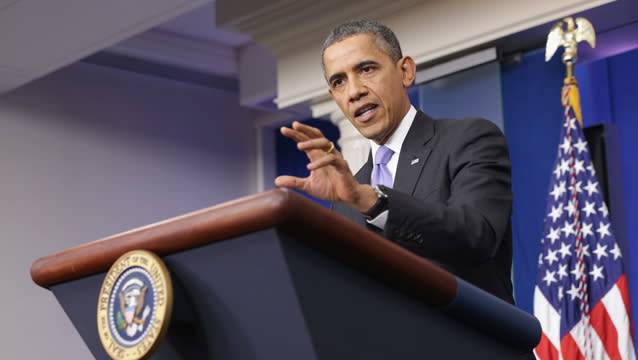Why Obama will have a much better year in 2014

Imagine if you had told President Obama one year ago that he’d end 2013 with dismal poll numbers and a “Lie of the Year” award—from the supposedly liberal mainstream media—to display next to his Nobel Peace Prize. Fresh off a convincing reelection victory, he probably would have dismissed it as mere Republican propaganda.
Obviously it isn’t. Obama had perhaps the worst year of his presidency in 2013, due largely to the disastrous launch of his healthcare reform plan and his now-disproved claim that “if you like your healthcare plan, you can keep it.” The president’s approval rating, around 43%, is nearly the lowest since he was elected. Voters say they’re more likely to vote for a Republican than a Democrat in the 2014 midterm elections, which could solidify Republicans’ control of the House and flip control of the Senate to Republicans as well.
But the midterms are still nearly a year away, and it could turn out to be a much better year for Obama and his fellow Democrats than 2013 was. For starters, the economy has considerable momentum going into 2014, whereas one year ago it was hobbled by the “fiscal cliff” showdown, which resulted in tax increases and spending cuts that curtailed growth throughout 2013.
“For the first time in several years, we approach the new year with no major cloud on the horizon,” Bank of America Merrill Lynch economists wrote in their preview of 2014.
Related: Expect "Upside Surprises" for the Economy in 2014: Nariman Behravesh
The pace of job growth in 2014 finally seems likely to accelerate. Job growth hasn’t been terrible, with the economy creating 7.5 million jobs, or about 207,000 per month, since hiring bottomed out early in 2010. But the economy backpedalled in 2013, with a sub-par 186,000 new jobs created each month, on average, and rampant economic uncertainty caused by antics in Washington and confusion over the Federal Reserve’s stutter-step pronouncements on monetary policy.
Related: Bull vs. Bear: Rosenberg and Yamarone debate 2014 economy
At least some of that confusion has been replaced by more optimism about the future.
“We see a lot more certainty for 2014,” International Monetary Fund Managing Director Christine Lagard said recently. “That gives us a much stronger outlook.” Here’s what has changed: A robust housing recovery is now underway, which could soon spread to a lot of first-time home buyers who have been sitting on the sidelines with their cash in a lockbox. The recent budget deal in Washington accomplished the minimum essential task of keeping the government open in 2014 and paying most of the government’s bills. And the Federal Reserve finally turned the corner and began to roll back “quantitative easing” after months of head fakes and hand-wringing; the news sent financial markets up rather than down, suggesting that fear of a rollback was worse than the rollback itself.
If the current pace of job growth continues, the unemployment rate will drop to 6.5% or lower by the time of the November midterms, and Obama will able to claim that the economy under his guidance created 10 million new jobs since 2010. That’s not enough jobs—during the same period of time following the 1981-82 recession, the economy created nearly 15 million jobs—but it’s pretty good as an electoral sound bite. And if Americans have a tangible sense that things are getting better, it will benefit the party in power.
That leaves Obamacare as the Democrats’ single-biggest concern going into the 2014 midterms. Conventional wisdom seems to be that this disruptive program will forever be an albatross around the necks of Democrats, who passed the law in 2010 with virtually no Republican support. But it’s worth asking: How much worse can Obamacare get? And with expectations now set remarkably low, is it possible the health law could end up looking better in 2014?
We’ll get an early glimpse of that around March 31, which is the deadline for Americans to comply with the “individual mandate” that requires them to have health insurance. If the number of enrollees exceeds seven million—the expectation for the first year of Obamacare—the White House will claim the program to be a come-from-behind success; anything less will perpetuate the impression of failure.
There’s also the question of whether the number of people helped by Obamacare will significantly outweigh those hurt by it, including people whose coverage has been cancelled because it didn’t meet new provisions required under the law, or whose premiums rose by excessive amounts. The biggest flaw with Obamacare, aside from the paleolithic-era website, is the impression that it helps some Americans at the expense of others. If Americans go to the polls in November viewing Democrats as nothing more than redistributionists, Republicans will romp.
Republicans have their flaws as well, of course, and their big opportunity to snatch victory from the jaws of defeat will come in the spring, when the government’s borrowing limit needs to be extended once again. If they provoke another tense standoff that threatens a default on U.S. debt, expect Obama to stand clear so the nation can watch Republicans self-destruct. Again.
The question for 2014 won’t be who makes a bold move to secure a political win. It will be who shows the restraint to do no harm.
Rick Newman’s latest book is Rebounders: How Winners Pivot From Setback To Success . Follow him on Twitter: @rickjnewman .

